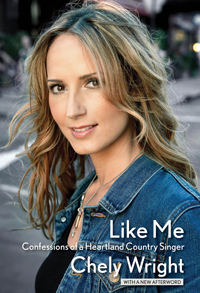Kirkus Reviews is the industry bible for bookstore buyers, librarians, and ordinary readers alike. Now Popdose joins the Kirkus Book Bloggers Network to explore the best — and sometimes the worst — in pop-culture and celebrity books.
This week, a country music star makes a life-changing decision and gives us a peek inside her head just before implementing it…

All popular musics traffick in identity politics, and perhaps none moreso than country & western. Country music is a passport to a semi-real place called ”the heartland,” a rite of citizenship for a self-identified Real America.
But where most forms of pop and rock are predicated on a rejection of the music of one’s elders — ”If it’s too loud, you’re too old” — country’s brand of listener identification emphasizes a rare generational continuity. It is family music, uniting parents, grandparents, and children in fandom. That makes it inherently slow to adapt to broader societal changes — meaning that, while individual country artists may hold political views ranging from Steve Earle’s outlaw socialism to the flag-waving ass-kickery of Toby Keith, the genre as a whole can fairly be called conservative, purely in a descriptive sense.
Nowhere is that more true than in the country community’s very traditional attitudes towards sexuality. There’s no reason to think that gays and lesbians are represented in any lesser percentage in the ranks of country performers than in the population at large; but they remain invisible. While rock and pop music have welcomed openly-gay performers since the 1970s, the country scene has (aside from k.d. lang, who was never a part of the Nashville establishment) presented itself as monolithically heterosexual. It was not until 2010 that a major Nashville country star would come out of the closet. That star was singer Chely Wright.
Burdened by the knowledge of being the first, Wright determined to make her emergence as an openly gay Nashville artist as public as possible. Her announcement was accompanied by the release of a new album (Lifted Off the Ground), an appearance on Oprah Winfrey’s TV show, and publication of a memoir, Like Me: Confessions of a Heartland Country Singer. Even by the standards of modern cross-platform media marketing, Wright’s disclosure was carefully-orchestrated.
Chely Wright’s continuing journey from terrified closet case to proud gay-rights advocate is chronicled in the new documentary Wish Me Away, now making the rounds of film festivals. On the occasion of the documentary’s release, it’s worth revisiting Like Me, the centerpiece of Wright’s multimedia campaign.
What’s surprising about Like Me is how admirably raw it all is. Wright frames her story with a harrowing account of her ”bottoming out” — hitting such a depth of depression and self-loathing that she contemplated suicide, only to come out the other side determined to rebuild her life on a foundation of truth about her own sexual identity. The narrative backstory that led to her breakdown (and breakthrough) is fragmented, skipping freely backwards and forwards in time, with short chapters following thematic currents rather than a narrative through-line.
The writing is polished and careful, and Wright doesn’t dwell on ugly or prurient details. But the structure is something like the stream of consciousness, mimicking the racing of an anxious mind as you lie sleepless and full of regret — as Chely Wright did, rarely leaving her bed for weeks on end — thoughts flitting from shame to shame, wondering what you might have done differently. In its very refusal to tidy up the chronology, in its rejection of pat resolutions, Like Me has the immediacy of a recovery journal, and pulls the reader into the mounting misery and hopelessness that led to Chely Wright’s downward spiral.
Read the rest of this article at Kirkus Reviews!





Comments